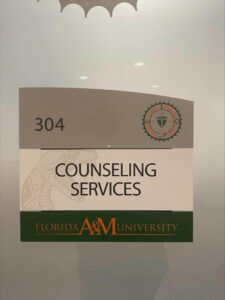
In-person classes or remote, as Florida A&M and many other schools opted for during the past school year? Which do you prefer?
Students’ preferences can provoke intense feeling of anxiety, which can affect their motivation and performance.
Alicia Jackson is the coordinator of clinical programs and a counselor in the Office of Counseling Services at FAMU. She says virtual counseling sessions have been offered since the end of summer 2020, and that students welcomed the Zoom sessions.
“There has absolutely been an increase in students needing services this semester,” Jackson said. “I do not have the data yet, to discuss exponentially, however, the demand of intakes and scheduling has shown that students are in need [and/or] using services,” she said.
Jackson says common reasons why students are experiencing anxiety since being in-person includes: academic expectations, family distress, stress in general, being social or becoming more social, and thinking about their futures.
Jackson provides coping skills for students experiencing anxiety, and she is willing to do so virtually or in-person.
“Deep breathing, muscle relaxation, exercising [going for a walk], doing something fun and enjoyable [a hobby], reaching out to someone [a friend or counselor] and positive affirmations are a few choices,” Jackson said. “However, if you would like to know more ways to cope during this time, please check out our OCS COVID-19 Coping Corner via our website. Just click COVID-19 Coping Corner in the left-hand menu section. This resource is available to all FAMU students and has a plethora of information from how to increase motivation to how to deal with stress.”
Students can call the Office of Counseling Services at (850) 599-3145 or go into the office on the third floor of the CASS building to make an appointment for a virtual or in-person session.
Kaleb Thompkins is a jazz performance student at Florida State University who experienced extreme anxiety while taking virtual courses last year.
“When I’m in my virtual classes, I feel like everybody is watching during Zoom class meetings,” Thompkins said. “I’m an introvert so the feeling of all eyes on me is very overwhelming. A lot of my virtual classes used a lockdown browser for tests and I felt uncomfortable with the idea of being recorded.”
Thompkins wanted to keep his camera off during class sessions and watch some of his favorite YouTubers before logging into class to help with his anxiety.
“Seeing my struggles with my anxiety also encouraged me to go seek therapy about it and it’s been a tremendous help,” he said.
Nyasia Haynes, a junior biology pre-med student at FAMU, is experiencing the opposite of Thompkins’. She’s been dealing with anxiety since being back on campus.
“After not being in this setting for a year, I became a little too comfortable with it and now full classrooms, especially my full labs, make me extremely anxious,” Haynes said. “The sense of crowdedness gets to me sometimes and the end of class honestly couldn’t come faster.”
Gwendolyn Singleton is a FAMU faculty member and director of the Center for Ethnic Psychological Research and Application. Singleton shares the center’s current findings from research being conducted on anxiety during the COVID-19 pandemic.
“We found that anxiety was higher in freshmen due to college being a brand-new experience in general,” she said. “Seniors were higher in anxiety than graduate students because of their worry of transitioning after college with finding jobs.”
Singleton said students shared that one factor that causes anxiety now that the university has returned to in-person classes is having to wake up, get dressed, find a parking place and get to class on time every day. Students quickly adjusted to the convenience of virtual classes last year, she said.
Assistant professor and psychology undergraduate coordinator Leona Johnson says being self-aware helps treat anxiety.
“It’s important for students and faculty to pinpoint what is causing the stress,” Johnson said. “Once it’s identified, then you can solve the problem. I suggest eating well, getting sleep, meditating and even listening to music. Do what makes you feel best.”
Singleton and Johnson suggested that students download the WellTrack app which is a self-help app that teaches coping skills for anxiety, depression, stress, and public speaking. You can download the app for free and the access code is FAMUOCS18. If students want to talk to someone after hours, they can call the after-hours line WellConnect at (833) 848-1765.